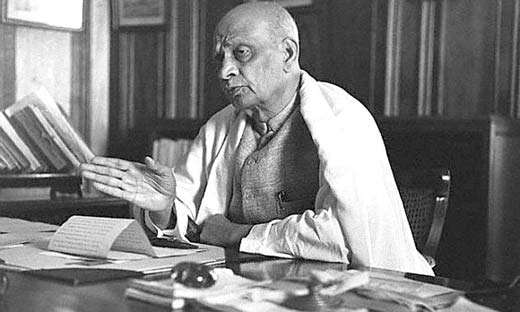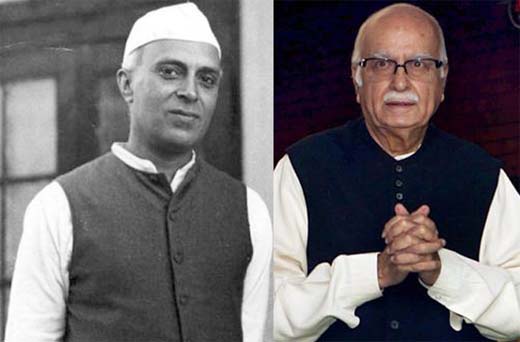Modi’s love for Sardar Patel, a congressman, has reignited debate about his role in marginalizing Indian Muslims. Dr Altaf Hussain Para revisits some of the major incidents in history to understand BJP’s desperate hunt for heroes

Going by the recent assertions of the BJP’s top brass to glorify Sardar Patel, a Congress stalwart who proudly claimed to be a Gandhian, as a national hero and the one who would have ended most of India’s national concerns – like that of Muslims, Kashmir, Pakistan and regionalism- had he been its first prime minister instead of secular-socialist-atheist, Pundit Jawaharlal Nehru, it seems to be only a matter of time when the RSS backed BJP adopts him as its official political ideologue. Earlier it was Narendra Modi, BJP’s prime ministerial candidate for 2014 elections, who declared a nationwide campaign on June 11, to collect small pieces of iron from farmers and use them to build a mega, ‘Statute of Unity’ in memory of Sardar Patel, the iron-man of INC, whom he declared the one who ‘brought the nation together’.
And now it is LK Advani, an isolated old hawk, who in his recent blog contested the perception that Sardar Patel was anti-Muslim and foolishly quoted a Congress apologist to collaborate his assertions.
Glorification of Patel, a Congress leader by Modi, a Hindutva icon who blessed the massacre of Muslims in Gujarat a decade ago and Advani, a veteran communal propagandist, who blessed the destruction of the Babri Masjid, is not for nothing if one keeps in mind the fact that BJP is desperately in search of new heroes with national appeal and cannot sell Saverkers, Golwalkers and Mukharjees – its natural forefathers – in a country of hero worshippers, in its attempt to expand its social base in anticipation to the 2014 general elections.
BJP’s deliberate attempt to differentiate Nehru and Patel on ideological basis and to express its hatred for the former and love for the later is neither unnatural nor surprising. It was Nehru who once called the Jan Sangh which was founded by Shyam Prasad Mukharji on October 21, 1951 as an “illegitimate child of the RSS (Rashtriya Soyamsewak Sangh) and considered its existence a severe threat to the India’s national unity and Kashmir policy. When after Gandhi’s unfortunate murder the fortunes of RSS started declining, it was Patel who made every attempt to rehabilitate it and to give it official legitimacy. He declared, while taking on to the secular nationalists, particularly Nehru: “In the Congress those who are in power feel that by virtue of authority they will be able to crush the RSS. By ‘danda’ you cannot suppress an organization. Moreover, ‘danda’ is meant for thieves and ‘dakus’….. After all RSS men are not the thieves and dacoits. They are patriots. They love their country…..They are to be won over by the Congressmen with love”. He wanted Hindu communal elements to flood Congress to balance the dominant secular group. The same generosity was not shown towards Muslims whom he considered hostages to be held as security for the fair treatment of Hindus in Pakistan. They were not [even most secular of them like Azad and Sheikh] considered trustworthy. Patel has been quoted while asserting on January 3, 1948: “one fact is indisputable. Many Muslims in India have helped for the creation of Pakistan. How one can believe that they can change overnight? The Muslims say they are loyal citizens…To them, I would say: ‘why do you ask us? Search your own conscience’”. [Sardar Patel: Muslims and Refugees, 2004, p. 128]
Sheikh Mohammad Abdullah who worked very closely with Sardar Patel (albeit with bitter experience), concluded in his autobiography, Aatish Chinar, about the special love of Patel for Muslims and their newly established homeland in these words: “He was influenced by Hindu fundamentalism and wished to secure the interests of the Hindu revivalists. From the social and political standpoints he was a staunch reactionary….During the communal clashes he encouraged the Hindu communalists to combat the Muslims. Once, while talking to me, he said that the one way to destroy Pakistan was to drive more and more Muslims there so that it may burst at seams and be forced to come to terms with India.” Rajmohan Gandhi, in his biography of Patel, (Patel: A Life) suggested that he (Patel) spoke of evicting all the forty million Muslims from India if Pakistan threw out the Hindus in the territory and to extending non Muslim zone from Punjab to Delhi and Western UP (pp. 431 & 497).
Not only is BJP’s approach on ‘Muslim question’ in line with Patel’s approach [which L K Advani wants us to believe is on ‘secular’ lines] but they also share with him ideological uniformity on so many other important issues. For paucity of space note the following brief references. Patel never forgave Nehru for keeping him away from Kashmir affairs. He once complained that “if Nehru and Ayyangar had not made Kashmir their close preserve separating it from my portfolio of Home and States, I would have tackled the issue as purposefully as I had already tackled the Hyderabad problem”. That is by massacring and suppressing Muslims. P. Sunderayya in his book (Telengana People’s Struggle and its Lessons, pp. 88-89) brilliantly highlighted the “untold miseries” that were inflicted on “the ordinary Muslim people”. But then Sardar actively involved himself in Kashmir affairs, albeit in his own way.

Patel had a special love for the RSS. He regarded its members as I mentioned, at worst as “misguided patriots” (The Brotherhood in Saffron, By Walter Anderson and Shridher Damle, pp., 55-56) and invited them to join Congress. Thus, he used the RSS who had close relations with the Maharaja Hari Singh to woo the later to join Indian Union. He blessed the Golwarkar mission to Srinagar in October 1947. Golwalkar urged the Maharaja to recruit more Panjabi Hindus and Sikhs (perhaps who were migrating to the state from Pakistan) into his army (ibid., p. 49). It should not surprise anyone then that, both, Nehru and Gandhi discovered in December 1947 that arms send by the Indian army to the National Militia raised by the National Conference were diverted to the members of the RSS activists in Jammu to massacre the Muslims there to change the state’s demographic composition. When Nehru complained Patel on 30 December, that “I am inclined to think that [Mehar Chand] Mahajan (who was appointed prime minister by Maharaja at the recommendation of the Patel after sacking pro-Pakistan R C Kak) sympathizes with these activities and perhaps help them,” Patel foolishly denied the charges, a week later, by citing the enquiry conducted by Mahajan himself (Sardar Patel’s Correspondence, vol. I, pp.143 & 152).
Patel was neither interested in getting Kashmir acceded to India on the basis of any ideological uniformity with the state’s political movement, not does he ever trusted its Muslim leadership. He reposed his trust in Hari Singh and wanted him to join India on the basis of his State’s past Hindu history. Thus, he wrote a letter to Maharaja on 3 July, 1947 which stated: “I wish to assure you that the interest of Kashmir lies in joining the Indian Union and its Constituent Assembly without any delay. It’s past [read Hindu] history and traditions demand it, and all India looks up to you and expects you to take this decision.” However, in view of the adverse public opinion in the state, Patel knew that it would take some time to Hari Singh to make the decision. Therefore, he suggested to the Maharaja that “in the meantime, I am expanding as much as possible the linking up of the State with the Indian Dominion by means of telegraph, telephones, wireless and roads” (ibid. pp. 32-34 &42-43). This was after securing a land link to Kashmir through the Redcliff Boundary Commission and getting the pro-Pakistan R C Kak removed.
Patel was frustrated by the Nehru’s offer of plebiscite as a rider to the Maharaja’s accession to India. Thus, in a conversation with his secretary, V Shankar, he remarked disapprovingly: “don’t you see we have two UN experts- The Prime Minister and the other Mountbatten – and I have to steer my way between them”. He was particularly disappointed when he saw prospects of the plebiscite getting brighter, thanks to the efforts of Own Dixon. A dejected Patel wrote to Nehru on 27 June, 1950, “if we are not careful, we might land ourselves in difficulties because once demilitarization is settled, a plebiscite would be, as it were, round the corner.” Thus, by publicly endorsing the offer he, along with Nehru, was only befooling the Kashmiris.
Patel’s hatred for Sheikh Abdullah is not unknown. He never forgave him for introducing radical land reform in the state, which he repeatedly dubbed as anti-Hindu, and for sidelining his autocratic and feudal protégé – Maharaja Hari Singh. His repeated attempts of forcing Abdullah to halt the land reforms, only infuriated the later for his fate solely depended on the reforms in the wake of an impending plebiscite. Thus, an agitated Sheikh, refusing to budge, wrote to Patel: “It is my firm conviction that it was our rigid adherence to that [New Kashmir] program that has saved us from the orgy of communalism during the last crisis” (N N Raina, Kashmir Politics and Imperialist Maneuvers 1846-1980, New Delhi, 1988, p. 163).
Land reforms became a reality and a frustrated Patel started poisoned Nehru’s ears, forcing him to appoint B N Mullik (Director of Intelligence from 1950 to 1965) to report on rumors concerning Abdullah’s alleged hostility to India and allegations by “large numbers of Kashmiri Pundits and Jammu Dogras”. Mullik found the allegations and rumors baseless and observed that Sheikh’s support to India was genuine. Patel was shocked. He brainwashed Mullik, (and, thus, laid the foundations of a disastrous approach of Indian Home Ministry towards Kashmir based on suspicions) that “Sheikh would ultimately let down India and Nehru and would come in his real colors.” His efforts bore fruits. Mullik wrote that future events “proved that the Sardar was right and I was not.”
Thus, Patel’s hatred towards Muslims and Pakistan, his distrust towards Sheikh, his strong opposition to the Article 370 and his love for RSS are the ideals very dear to Modi and his early mentor L. K. Advani and which they will surely use to provoke communal passions in India. It will be interesting to see how INC will stitch the torn garb of secularism they used to cover BJP’s new hero with.
Author teaches history in Amar Singh College and be reached at [email protected]














